Rachel Helps, the Coordinator of Wikipedia Initiatives at BYU’s Harold B. Lee Library, discusses her experience as one of a group of 2019 AML Novel Award judges, and provides a round-up of some of the novels that were considered for the award.
I understand the importance of receiving an award for an author from a journalism standpoint. I edit Wikipedia for my job, and winning an award can qualify an author for their own Wikipedia page. I’ve edited pages for authors in the past who have won the award and listened to interviews where they talk about how much the award meant to them or how they hoped to win it at some point in their career. I feel the mantle of responsibility placed on judges. As a former psychology student, I’m also very aware of our tendency to like things we read first or last in a series or for certain books to stand out in our memory for reasons other than good writing. To combat these tendencies, I made a complete scoring rubric, and another judge even scored the books according to it along with me.
I also worried about dismissing “genre” books for not being literary enough. I’m happy that we had books from several genres in our finalist list. I ended up reading eleven of the seventeen books on our list. My biggest regret is that I wasn’t able to follow the events in Witchy Kingdom, the third in Butler’s epic fantasy series. I hope to go back and read that series from the beginning!
I felt that our award should be determined by common consensus. I wanted Irreversible Things to win the award, but I had no counter to the fact that it is not, in fact, a novel. The underlying theology implied by the ending of Muddy still bothers me, as I mentioned in my review of it. The other judges liked it more than I did and persuaded me that it should win over a Zoom meeting. That is the unglamorous look behind the curtain! I gave the judging my full effort but I’m still not sure if I did it right. Forgive my biases and errors, and thank you for giving me this opportunity to serve. [The AML Board decided to give Irreversible Things a Special Award in Literature.]
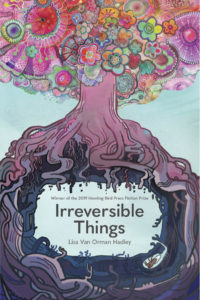 Irreversible Things by Lisa Van Orman Hadley
Irreversible Things by Lisa Van Orman Hadley
Delightful fictional vignettes inspired (I assume) by Hadley’s own life. Sometimes in fiction it feels like childhood is completely romanticized, but Hadley’s girl narrator felt so real as she played truth-or-dare with her friends, moved to Utah, observed her aging progenitors, and coped with her own infertility. She has a chapter on feeling itchy when everyone’s being checked for lice at school. A chapter about how she tells her mom she wants store-bought chicken pot pie for her birthday, but her mom tries to make them and they are very unsatisfying. Very slice-of-life kind of things that feel real and unfinished. The scenes are clever, hilarious, heart-nudging, and nostalgic. My only complaint was that I wish it had been longer.
Here are a few quotes:
“We claw ourselves up our mother’s body like it belongs to us.”
“She tells us that we will eat slices of homemade bread as thick as a Bible at the ZCMI mall downtown.”
“While they are dressed in coordinated snow pants and parkas with season passes hanging from their zippers, I look like an overweight carpool mom who robs banks on the side.”
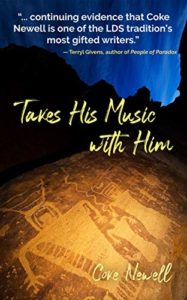 Takes His Music with Him by Coke Newell
Takes His Music with Him by Coke Newell
A Navajo boy, Henry, is adopted by a German-American couple living in Blanding, Utah. As a teenager, goes on a vision quest into the sacred space of the desert. His dad, Truman, goes out to rescue him.
This book is rough around the edges. It repeats information, and harps on ATV “wreck-reators” so much that I felt uncomfortable with it. I thought maybe it was unjustified, but an Internet friend told me that Blanding is actually very hostile to any “environmentalist”-types, much more so than the cityfolk I encounter in this metropolis of Provo. Blanding may be blatantly anti-conservation, to the point of destroying artifacts and wildlife just smear it in “libtard”‘s faces, but that is not representative of Utahns as a whole. Usually people on either “side” can agree with saving park lands for recreation like hiking. Cattle grazing is a different story though!
I didn’t like the format of the book. It’s almost all background–Truman or Henry just thinking about things in the past. I don’t mind non-linear storytelling, but most of the background wasn’t relevant to the plotline. So why not start linearly? I felt like the chapters were written separately at first and pieced together, and then Newell didn’t bother to streamline the information. Or maybe he left in the repetition on purpose–it would be useful if I were reading the book over a long time period.
Henry becomes distant from his adoptive parents and starts calling them by their first names as a teenager. From what I know of children who were adopted as babies, they consider their adoptive parents to be their parents. Henry’s distancing seems more typical of a foster child adopted at an older age. I haven’t made a special study of the subject, but that was my impression. Certainly it makes sense that he would want to have some connection to the cultural traditions of his birth parents. Having the vandals show up right at the climax of the book seemed a bit excessive to me. I don’t read literature to dig into my dislike of people–I read it to try to understand others better. So I would have liked it if the vandals had actually been someone Henry knew who he could reconcile with, but I guess that’s about as unrealistic as having them be faceless villains to Henry’s vision quest.
Newell’s writing style is entertaining, but this book was too long. I think it could have had less background and more things happening (maybe with the same material in a different order). I enjoyed the descriptions of pictoglyphs, and it made me want to learn more about them. Truman’s interest in environmental literature seemed like a thin veil for Newell to express his own fondness for the genre. Most of the outdoorsy people I know don’t want to sit around reading about other people’s adventures… they want to go outdoors themselves! Okay, Truman can like Muir!
Some parts were very touching or clever or funny. Some parts were boring. Some parts made me feel exasperated because Truman was hand-wringing over anti-environmentalists again and it was annoying. It was a very man-centric narrative.
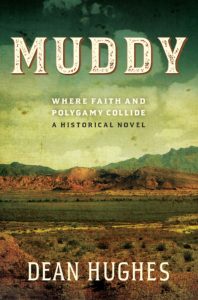 Muddy: Where Faith and Polygamy Collide by Dean Hughes
Muddy: Where Faith and Polygamy Collide by Dean Hughes
This story of a Mormon couple who help colonize a remote settlement is well-written. The historical setting is well-researched, there is good diversity of experiences and the book doesn’t shy away from sensitive topics like miscarriage, polygamy, and the difficulty in obeying church leaders. However, I couldn’t help feeling like the story was a neatly packaged moral tale. Here we are dealing with all these messy topics and the characters feel guilty about thinking complaining thoughts. Come on! Morgan has completely understandable doubts, but casts them aside after having two conversations with his bishop? He only has one mental breakdown towards the end and it’s because God has finally broken his will so that he will capitulate to God in all things?
It would be one thing if the book completely whitewashed polygamy and the hardships pioneers endured. Then I could dislike the book without reservations. It was so close to expressing the deep hardships I’ve read about in history books, but somehow fell short. Where were the families grieving their many children who died? The discomfort from long-held disagreements within a family? The actual faith crisis these trials present?? Where was Louie B. Felt, our first primary president, who lost her ability to have children after a miscarriage in the Muddy? It felt like Morgan did have to make sacrifices, but the worst thing that happened to him was that he had to move a lot and marry another wife (which we could all see coming a mile away). Where was his grief over the pregnancies Abigail lost? He gets angry at God but keeps praying and everything gets better. What if he kept praying but things got worse?
I would have liked for this book to show more scenes of women interacting with each other instead of just describing that they “chatted.” I know the story focused on Morgan’s family, but I would have liked to see more women in leadership positions or just actually talking to each other more. Maybe since I’ve been writing a videogame that deals with similar themes, I’m especially critical of writing in the same topic. Honestly, the ending moral “stamp” on the story was what made me feel so upset. Having your baby live because you ask God “thy will be done” is going to put you on the road to misery, theology-wise. Then what happens when your baby dies? It’s a punishment from God? In my life it has been better to accept that we live in a world where evil and tragic things happen, not because God wills it or allows it, but because that is the nature of the fallen world we live in.
Putting the final scene aside, the treatment of obeying the prophets had some interesting discussion around it. Morgan was forced to confront that sometimes Brigham Young was making decisions based on many factors. Inspiration comes to us through our knowledge of what we should do, and sometimes our knowledge is flawed. However, the conclusion was that “obeying your leaders is always good even if you can’t tell how.” That’s not an absolute I’m comfortable supporting. Sometimes you need to COMMUNICATE with your leaders and make decisions together. Wasn’t part of the problem that Brigham Young didn’t have good information about Muddy? It seems like instead of advocating total obedience, the moral should be that it’s okay to question your leaders or “give up” on an assignment if it’s too much for you and your family. But instead Morgan “felt affirmation, a sense of peace, as he tried to accept Bishop Morrison’s words” (about the correct location to settle within Muddy).
This book is set in the 1860s but as you can tell, the topics it deals with are relevant to today. It contains assumptions I don’t think are part of official LDS doctrine but that have definitely been part of LDS culture. It feels like the author is being didactic through the bishop, but maybe he’s simply representing historical views. The sequel is going to be set in Orderville, and I’m curious to see if Morgan’s faith changes and evolves further, or if it will simply re-hash the same theological arguments presented in this book.
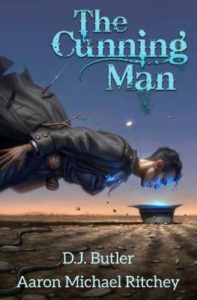 The Cunning Man by D.J. Butler and Aaron Michael Ritchey
The Cunning Man by D.J. Butler and Aaron Michael Ritchey
Hiram, a practicing Mormon in the 1930s also practices folk magic on the side, but strives to hide it from his adopted Indian/indigenous son. On a trip to give food to miners working in a closed mine, Hiram investigates the reason for the mine’s closure and yes, of course there are other people using folk magic and demons. I haven’t read many books set in the 1930s and I enjoyed that. I also enjoyed learning about how Mormon folk magic could have ended up if people still practiced it. Hiram uses a dowsing rod, a peep stone, lamens, and other magical artifacts. He also uses scripture verses as charms, and his “personal worthiness” affects the efficacy of his magic. Except he doesn’t like calling it magic and prefers to be called a “cunning man.”
There were a lot of things going on–different factions with their own motivations and reasons for their involvement with the dark power in the mine (come on, you know if it’s a book about folk magic there’s going to be a ghost or zombie or something in the mine). I think my main complaint is that there were a few times where I understood that a character was doing something for plot reasons, but I didn’t understand their narrative reasons for doing so. For instance, at one point Hiram takes a break outside and happens to meet someone who was lost. It feels like the only reason he took a break was to meet this person by happenstance. I guess you could argue that the charms he used made it so he was in the right place at the right time for certain things… but I would have liked that to be clearer if that was the case. There were also a few times when I guessed what was happening before the protagonist, which made me think the protagonist was stupid, when it was more of an issue of too strong of foreshadowing. I was also surprised when people started dying, because for some reason I thought the book would be more of a “weird mystery” than a horror-type book.
That said, I enjoyed the characterization and the conversations. Michael, Hiram’s adopted teenage son, seemed to serve as an anti-trope to common Native American tropes. Instead of being a strong, silent man of the woods, Michael is a mouthy, sarcastic teenager with aspirations to be a scientist. Sometimes he seemed a little extreme (not even my biology-enthusiast brother calls houseflies by their scientific names), but most of the time he provided necessary comic relief. Other characters were not as well-developed and the depth of their involvement was on a higher level. I was surprised at the end to find out the motivation for one of the characters… and that I won’t spoil. Recommended if you enjoy urban fantasy and/or horror.
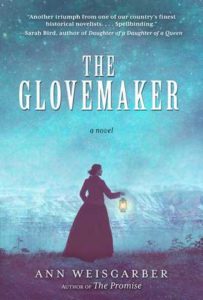 The Glovemaker by Ann Weisgarber
The Glovemaker by Ann Weisgarber
Another historical novel set in Utah during the time right after polygamy was outlawed with a woman protagonist, like Ezekiel’s Third Wife. Also in common with Ezekiel’s Third Wife: a bunch of worrying about lawmen and absent husbands and very little happening over a short time period. Weisgarber got a few things wrong about Mormon practices, like stating that a character had been baptized as an infant and discussing how the town needed to “elect” a bishop, when children in the LDS church aren’t baptized until age 8 and bishops are always (?) called by a higher-up leader. The ending was satisfying but not cloying, but the pacing was boring. The writing was fine, but I think I am done with pioneer-era polygamy novels for a while.
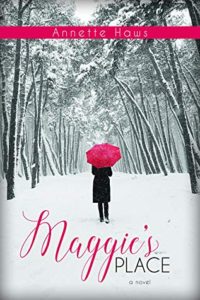 Maggie’s Place by Annette Haws
Maggie’s Place by Annette Haws
This novel centers around a older lady and a homeless young women in Salt Lake City during the holidays. Haws included lots of details in the setting, giving it a strong sense of place and time. Things like the smell of wool in a knitting shop, a couch with a rip in one cushion, and the care older people take when walking in icy conditions. I liked how many older women characters there were and how they were distinct from one another.
I felt a little confused about the book’s point-of-view a few times, since it seemed to follow a limited perspective most of the time, but not all the time. Maybe I’m bad at reading?? There were some delightful turns of phrase in the descriptions and I enjoyed reading it. A few people told me that the ending was a little trite and I agree with them, but I can forgive that since the book dealt with some other issues without sugarcoating them, like fraud and suicide. I also felt like Maggie’s relationship with her children was not fully explored. That said, this is the best holiday book set in Salt Lake City I’ve ever read :-).
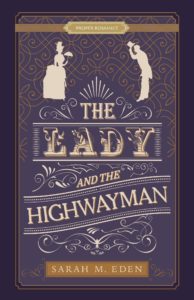 The Lady and the Highwayman by Sarah M. Eden
The Lady and the Highwayman by Sarah M. Eden
This was a light read about a woman who secretly writes as a penny dreadful author! She meets another penny dreadful author of a lower class! The setting is in Victorian London, which I think would be a difficult time period to write about now since many popular classics occur in Victorian England. The characters spoke believably, though the explanatory cultural asides were at times tiresome. I think my favorite part was the chapters of the penny dreadfuls written by each of the two main characters–I loved how they reflected the authors’ personalities.
Otherwise the plot seemed a bit predictable, and I didn’t find the romance particularly exciting. It seemed like the characters were worried about their mismatch in class, but there weren’t any noticeable consequences to it, only the threat of Elizabeth losing sponsors for her school. It seemed like the characters themselves had modern sensibilities, not Victorian ones, but I suppose they are meant for modern readers.
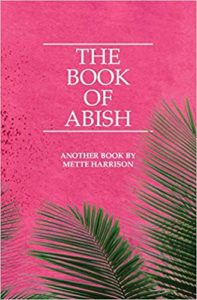 The Book of Abish by Mette Harrison
The Book of Abish by Mette Harrison
I had high expectations for this book, a retelling of the Abish story from The Book of Mormon, but they were not met. The characters do not inhabit a world that matches my conception of a Book of Mormon world. Abish grows up in a privileged life, with boxes of toys, her own play house, and silk (not introduced to the Americas until the late 1500s). At one point, Abish is with her mom going clothes shopping at the market and asks a strange man why he prefers to spend time with his son. First–the Lamanites have such a large society that they have luxury goods? And they don’t know everyone in their city? And the society is arranged in such a way that a young girl can approach a strange man in public and this is not a strange thing? And the men shake hands with one another? I would have preferred a more consistent modern setting, because these kinds of details made it difficult to immerse myself in the narrative. I would have liked some evidence that this story was occurring in a North American setting rather than a European feudal one (other than a chariot pulled by… goats??).
Setting the the lack of world-building aside, other than Abish, most of the characters were one-dimensional. My favorite part was when Ammon arrived and we got to see his actions through Abish’s eyes. I would have preferred this book as a short story, without the first half, which seemed over long a too “poor Abish” for my tastes.
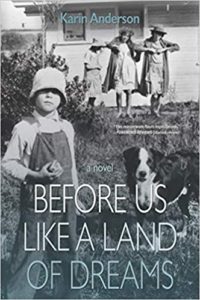 Before Us Like a Land of Dreams by Karin Anderson
Before Us Like a Land of Dreams by Karin Anderson
St. Ignatius (I’m not sure which one) has a method of spiritual contemplation where you imagine yourself in the sacred scene and describe as many of the sensations and accompanying thoughts to really immerse yourself in sacred works. I first heard of it this year while listening to Harry Potter and the Sacred Text. Anderson uses this immersion technique to imagine what life was like for her ancestors. She makes them into characters with their own motivations and demons. Their stories span the last two centuries, and some of them are only connected with a loose frame story. It’s kind of like a series of vignettes, except messier.
As far as I can tell, the historicity is pretty good. There was only one time where a pioneer woman was quoting the Book of Mormon and I wondered if pioneers were actually familiar enough with the Book of Mormon to quote it. Certainly I’ve read that early members in England did not have very many Book of Mormons and had not read it. I’d be happy to know more about that.
There was a good diversity in the ancestor stories. I hadn’t read anything like it before. Anderson’s word choices were often highly appropriate to the given time period (and sometimes inappropriate). I think it was difficult for me to emotionally connect with characters because they changed so often. I wanted there to be more commonalities between ancestors–to see more of what certain personalities passed down. Maybe that was there but it was just difficult to keep track of?
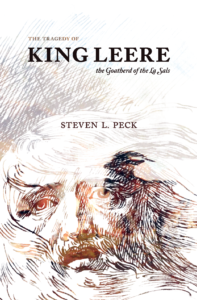 The Tragedy of King Leere, Goatherd of the La Sals by Steven L. Peck
The Tragedy of King Leere, Goatherd of the La Sals by Steven L. Peck
This book shares many qualities with books I love. It has weird characters, including a retired demon and a newly conscious battle droid. It is lovingly set in the La Sals region, in a possible future where it is ravaged by the effects of global climate change. And since it was written by an ecologist, with notes from a conservationist, you know the science is good. The SF fan in me would have liked for more speculative science exploration. The plot is based on Shakespeare’s King Lear and I didn’t care for it–all about people dying and hating each other and in-fighting because of stupid miscommunications, assumptions, or obvious character flaws.
I’ve been having a bit of an existential crisis over not liking this book and another that recently came out from BCC Press. Have I changed? Am I depressed? I’m not sure what it is, but maybe pregnancy has made me less fond of stories where people die a lot. Some (fictional) mother put a lot of work into making that (fictional) once-child! Or maybe I just hate everything now. *shrug
